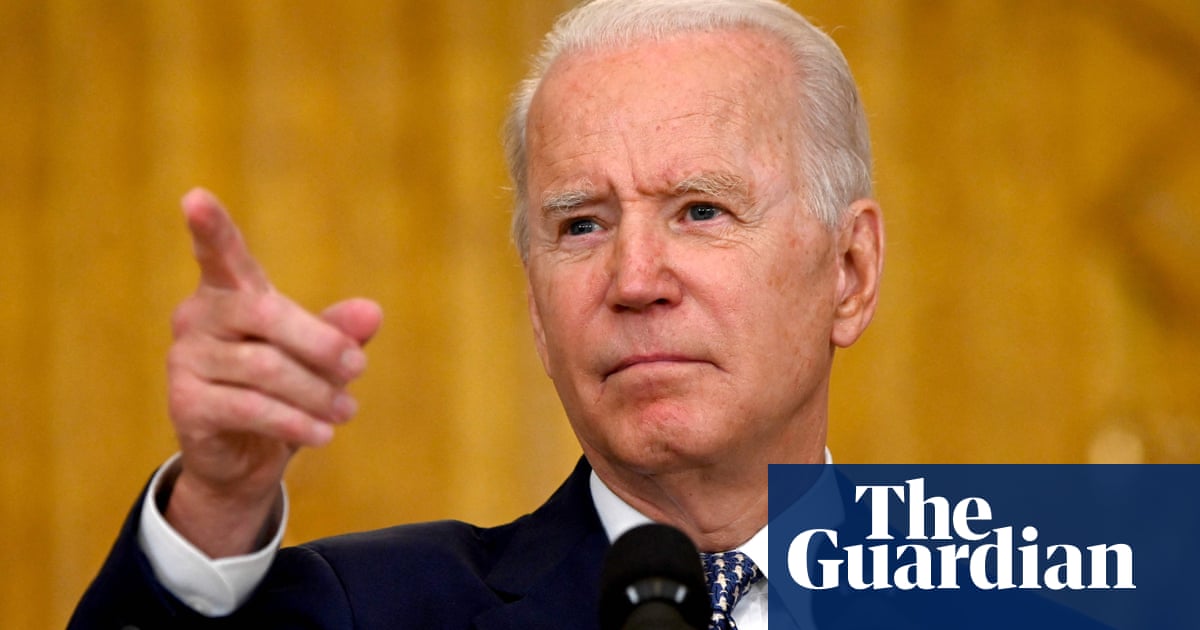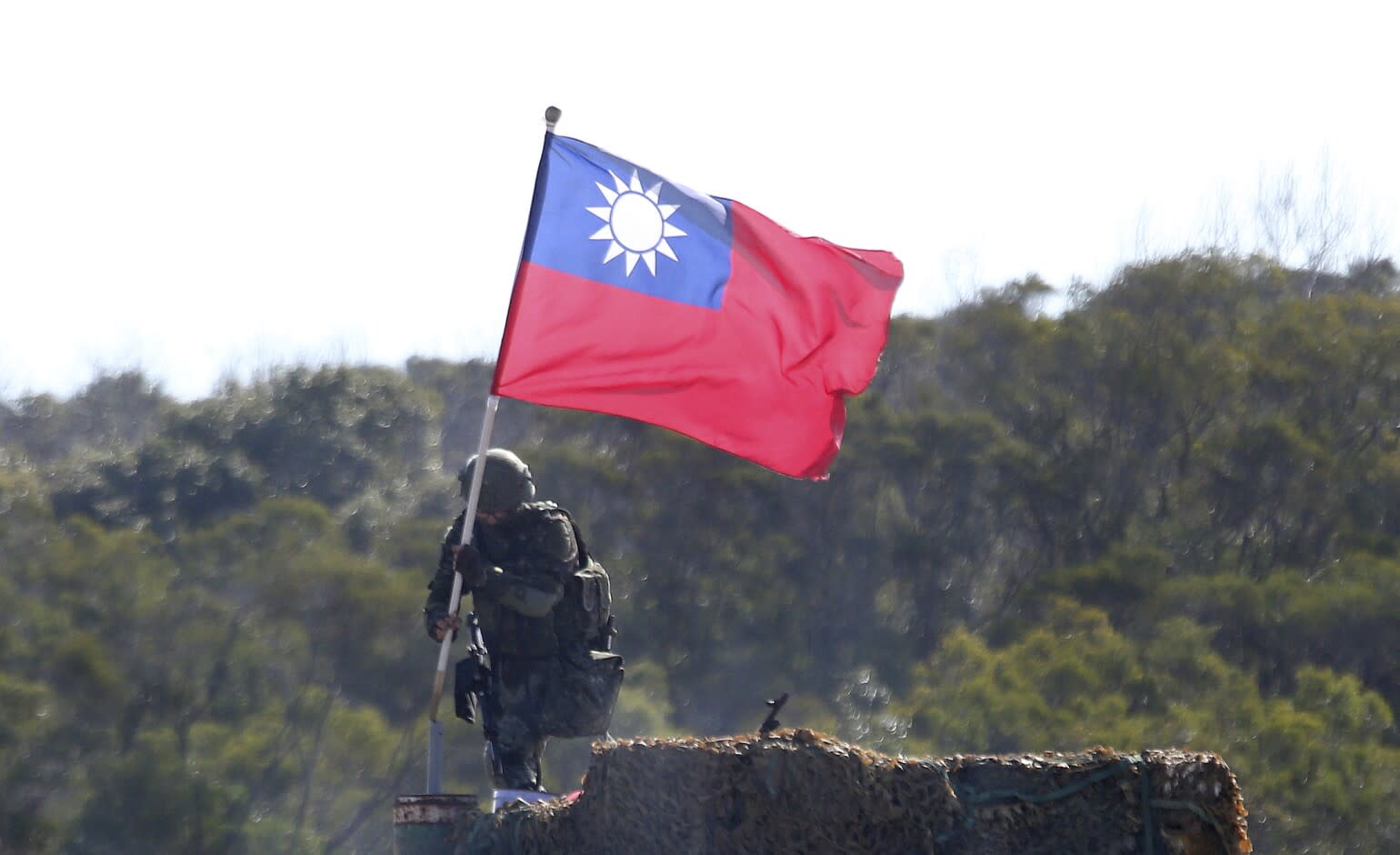White House backtracks after Biden appears to say US would defend Taiwan against China
 ]
]
A senior Biden administration official said US policy on Taiwan had not changed after President Joe Biden appeared to suggest the US would defend the island if it were attacked, a deviation from a long-held US position of “strategic ambiguity”.
In an interview aired by ABC News on Thursday, Biden was asked about the effects of the chaotic US withdrawal from Afghanistan and responses in Chinese media telling Taiwan this showed Washington could not be relied on to come to its defence.
Biden replied that Taiwan, South Korea and Nato were fundamentally different situations to Afghanistan and appeared to lump Taiwan together with countries to which Washington has explicit defence commitments.
“They are … entities we’ve made agreements with based on not a civil war they’re having on that island or in South Korea, but on an agreement where they have a unity government that, in fact, is trying to keep bad guys from doing bad things to them,” the president said.
“We have made, kept every commitment. We made a sacred commitment to article 5 that if in fact anyone were to invade or take action against our Nato allies, we would respond. Same with Japan, same with South Korea, same with Taiwan. It’s not even comparable to talk about that.”
A senior Biden administration official said later on Thursday that US “policy with regard to Taiwan has not changed” and analysts said it appeared that Biden had misspoken.
China’s embassy in Washington and Taiwan’s representative office did not immediately respond to requests for comment.
Washington is required by law to provide Taiwan with the means to defend itself, but it has long followed a policy of “strategic ambiguity” on whether it would intervene militarily to protect Taiwan in the event of a Chinese attack.
Article 5 is a Nato agreement that states an attack on one member of the alliance is viewed as an attack on all.
South Korea is also a US treaty ally with a mutual defence agreement, but US relations with Chinese-claimed Taiwan have been unofficial since Washington switched diplomatic recognition to Beijing in 1979.
Some prominent US academics and others have argued Washington should give Taiwan a more explicit security guarantee in light of increasing military pressure from Beijing. But Biden’s Indo-Pacific policy coordinator, Kurt Campbell, has appeared to reject this, saying in May there were “significant downsides” to such an approach.
Bonnie Glaser, a Taiwan expert at the German Marshall Fund of the United States, called Biden’s apparent mischaracterisation “unfortunate”.
“The US had an article 5 commitment to Taiwan from 1954 to 1979. The Biden administration isn’t considering returning to that commitment, as indicated by public statements by Kurt Campbell.”
Earlier this week, Republican senator John Cornyn erroneously tweeted that the US has 30,000 troops in Taiwan, which has not been the case since before 1979.
Biden’s national security adviser, Jake Sullivan, was asked about Taiwan this week and called it a “fundamentally different question in a different context” to Afghanistan.
“We believe our commitment to Taiwan … remains as strong as it’s ever been,” he said, without specifying what the commitment was.
U.S. position on Taiwan unchanged despite Biden comment - official
 ]
]
Flags of Taiwan and U.S. are placed for a meeting in Taipei, Taiwan March 27, 2018. REUTERS/Tyrone Siu
WASHINGTON, Aug 19 (Reuters) - A senior Biden administration official said on Thursday that U.S. policy on Taiwan had not changed after President Joe Biden appeared to suggest the United States would defend the island if it were attacked, a deviation from a long-held U.S. position of “strategic ambiguity.”
In a interview aired by ABC News on Thursday, Biden was asked about the effects of the chaotic U.S. withdrawal from Afghanistan and responses in Chinese media telling Taiwan this showed Washington could not be relied on to come to its defense.
Biden replied that Taiwan, South Korea and NATO were fundamentally different situations to Afghanistan and appeared to lump Taiwan together with countries to which Washington has explicit defense commitments.
“They are … entities we’ve made agreements with based on not a civil war they’re having on that island or in South Korea, but on an agreement where they have a unity government that, in fact, is trying to keep bad guys from doin’ bad things to them,” he said.
“We have made - kept every commitment. We made a sacred commitment to Article 5 that if in fact anyone were to invade or take action against our NATO allies, we would respond. Same with Japan, same with South Korea, same with - Taiwan. It’s not even comparable to talk about that.”
A senior Biden administration official said U.S. “policy with regard to Taiwan has not changed” and analysts said it appeared that Biden had misspoken.
China’s embassy in Washington and Taiwan’s representative office did not immediately respond to requests for comment.
While Washington is required by law to provide Taiwan with the means to defend itself, it has long followed a policy of “strategic ambiguity” on whether it would intervene militarily to protect Taiwan in the event of a Chinese attack.
Article 5 is a NATO agreement that states that an attack on one member of the alliance is viewed as an attack on all.
South Korea is also a U.S. treaty ally with a mutual defense agreement, but U.S. relations with Chinese-claimed Taiwan have been unofficial since Washington switched diplomatic recognition to Beijing in 1979.
Some prominent U.S. academics and others have argued Washington should give Taiwan a more explicit security guarantee in light of increasing military pressure from Beijing, but Biden’s Indo-Pacific policy coordinator, Kurt Campbell, has appeared to reject this, saying in May there were “significant downsides” to such an approach. read more
Bonnie Glaser, a Taiwan expert at the German Marshall Fund of the United States, called Biden’s apparent mischaracterization “unfortunate.”
“The U.S. had an Article 5 commitment to Taiwan from 1954 to 1979. The Biden administration isn’t considering returning to that commitment, as indicated by public statements by Kurt Campbell.”
Earlier this week Republican Senator John Cornyn erroneously tweeted that the United States has 30,000 troops in Taiwan, which has not been the case since before 1979. read more
Biden’s national security adviser Jake Sullivan was asked about Taiwan this week and called it a “fundamentally different question in a different context” to Afghanistan.
“We believe our commitment to Taiwan … remains as strong as it’s ever been,” he said, without specifying what the commitment was.
Reporting by David Brunnstrom; Editing by Mary Milliken and Daniel Wallis
Our Standards: The Thomson Reuters Trust Principles.
US position on Taiwan hasn’t changed, despite promise to defend it, administration says

The Biden administration now insists the U.S. position on Taiwan, which for decades has been one of so-called “strategic ambiguity," has not changed, despite President Joe Biden vowing that the United States would respond to a Chinese attack on the island similarly to how it has promised to defend NATO allies.
During an interview with George Stephanopoulos of ABC News, Biden had promised the U.S. would “respond” to any possible Chinese invasion of Taiwan, pushing back on criticism from Chinese media that the Afghanistan debacle should make the island of Taiwan question whether the U.S. would protect it or abandon it.
AFGHANISTAN DEBACLE IS BIDEN’S SECOND SAIGON MOMENT
“Our policy with regard to Taiwan has not changed,” a senior administration official told the Washington Examiner. “The U.S. defense relationship with Taiwan is guided by the Taiwan Relations Act, as it has been for the past 40 years, and is based on an assessment of Taiwan’s defense needs and the threat posed by the PRC. We continue to have an abiding interest in peace and stability across the Taiwan Strait, and we consider this central to the security and stability of the broader Indo-Pacific region.”
Biden directly compared the U.S. commitment to Taiwan to the commitment the U.S. has made to its NATO allies and other allies in the Pacific. Stephanopoulos said that China was already telling Taiwan, “See? You can’t count on the Americans.”
Biden responded: “Why wouldn’t China say that? Look, George, the idea that we — there’s a fundamental difference between Taiwan, South Korea, NATO. We are in a situation where they are in — entities we’ve made agreements with based on not a civil war they’re having on that island or in South Korea, but on an agreement where they have a unity government that, in fact, is trying to keep bad guys from doin’ bad things to them.”
Biden argued: “We have made — kept every commitment. We made a sacred commitment to Article V that if, in fact, anyone were to invade or take action against our NATO allies, we would respond. Same with Japan, same with South Korea, same with Taiwan. It’s not even comparable to talk about that. … It’s not comparable.”
Story continues
Taiwan, known as the Republic of China, is an independent democratic island nation off the coast of mainland China. The Chinese Communist Party has long sought to bring the territory under its control, while Taiwan is self-governed and receives U.S. defense support, despite not being formally recognized. U.S. relations with Taiwan became unofficial in 1979 after the U.S. agreed to establish diplomatic relations with the Chinese Communist Party-ruled Chinese mainland. The U.S. follows what is referred to as a policy of “strategic ambiguity” on the issue of whether it would use U.S. military might to protect the island of Taiwan if Beijing attacks or invades.
Chinese state media quickly began exploiting the deteriorating situation in Afghanistan to push propaganda aimed at Taiwan, questioning America’s commitment there. One example from the state-run Global Times asked, “Washington just left despite the worsening situation in Kabul. Is this some kind of omen of Taiwan’s future fate?”
CLICK HERE TO READ MORE FROM THE WASHINGTON EXAMINER
The Taiwan Relations Act of 1979 states that it is the policy of the U.S. “to provide Taiwan with arms of a defensive character,” but it does not include a mutual defense agreement, reading that America’s stance was also “to make clear that the United States decision to establish diplomatic relations with the People’s Republic of China rests upon the expectation that the future of Taiwan will be determined by peaceful means” and “to consider any effort to determine the future of Taiwan by other than peaceful means, including by boycotts or embargoes, a threat to the peace and security of the Western Pacific area and of grave concern to the United States.”
NATO’s North Atlantic Treaty of 1949 includes an “Article V” mutual defense guarantee that “an armed attack against one or more of them in Europe or North America shall be considered an attack against them all” and the allies agree to “assist the Party or Parties so attacked by taking forthwith … such action as it deems necessary, including the use of armed force, to restore and maintain the security of the North Atlantic area.”
Washington Examiner Videos
Tags: News, Joe Biden, Taiwan, Taliban, NATO
Original Author: Jerry Dunleavy
Original Location: US position on Taiwan hasn’t changed, despite promise to defend it, administration says